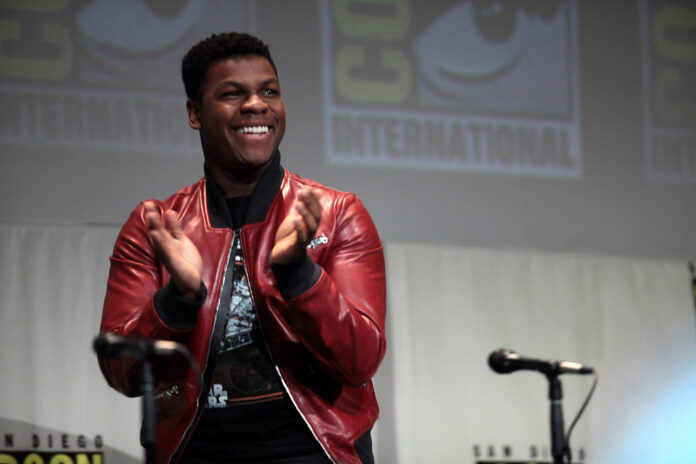Even in imaginary lands, Black people are still not safe.
This article was a finalist and winner of the 2020 DC Student Arts Journalism Competition. Click here to learn more about the competition.
Let’s be honest. When you think of science fiction, it’s likely the same recycled images that come to mind. Aliens from some distant galaxy; scientists perfecting time travel; maybe even mutant robots taking over the world. In fact, it seems as if in the imaginary lands science fiction conjures, there’s room for just about anything – that is, except Black people.
Somehow, in universes where zombies and jedis exist, diverse casts are still a stretch. Only recently have sci-fi creators begun to invite actors of color into their world. Last year’s “Watchmen” rollout on HBO followed by this year’s premiere of “Lovecraft Country” on the same platform contributed to this new, more colorful wave of sci-fi. Both television shows feature Black protagonists at the frontline of their storylines, which is a milestone in itself. For the first time, Black characters are the ones doing the exploring and discovering, reclaiming their place in a genre previously shut off from them, so why does this win feel so off-putting?
The selling point for science fiction is that it is just that- fiction. Stories that put the slightest twist on reality until everything we know becomes strange and unrecognizable but still discernibly untrue. So what happens when the genre blurs this line? When creators take very real historical occurrences and engrain them into sci-fi plots until truth blends with make believe. While this is typically a forgivable offense, it becomes a lot trickier when there are Black characters involved and the truth being distorted is actual Black history.
In “Watchmen,” between meeting floating blue men and wearing elaborate vigilante costumes, Regina King must also battle an underground white supremacy network. This re-envisioned version of Tusla, Oklahoma contains high-tech DNA tracking and men from space; yet, racism is the threat King must face. “Lovecraft Country” does the same thing. When they are not uncovering witchcraft, the show’s stars Journee Smollett and Jonathan Majors find themselves escaping from Sundown towns or getting their homes vandalized by racist white neighbors. Both shows have plenty of fantasy material to build off of but instead, they use the protagonists’ race as a crutch. Hannah Giorgis writes in the Atlantic “the show spends so much time focusing on its white characters’ near-comic monstrousness that it undercuts the development of its Black leads.” Directors and writers refuse to put in the work to expand on minority characters, and instead use their race as a scapegoat.
John Boyega, who played Finn in “Star Wars: The Last Jedi,” spoke on this disparity between the complexity of white characters and the shallowness of characters of color: “They gave all the nuance to Adam Driver, all the nuance to Daisy Ridley,” Boyega tells GQ Magazine. Writers of the “Star Wars” reboot lazily developed Boyega and other minority characters just as “Watchmen” and “Lovecraft Country” writers took the easy way out with their Black characters.
For sci-fi veterans like Samuel Jackson, this trend is not a new one. Jackson received nearly the same treatment ten years ago, with the characterization of his role as Mace Windu in the Star Wars franchise. Like Boyega, the detail and attention dedicated to other characters was not afforded to Jackson. Now, Jackson tells Interview magazine that watching shows like “Lovecraft Country” mimic the same plight Black people face in real life reminds him “nothing changed.”
In this interview with Smollet, Jackson tells the young sci-fi actress, “It’s the same conversation that’s been going on for me for 70-some years. It ain’t changed.” As appealing as racial storylines may be, it is nothing Black actors have not seen before. For a genre creative enough to construct entire new universes, sci-fi writers are still unable to transfer this open mindedness onto Black characterization.
This carelessness hints that Black people are still not welcome in science fiction, even if recent efforts suggest otherwise. This sense of not belonging expands to the treatment of Black sci fi actors off the screen as well. Boyega said he experienced a flurry of harassment from racist “Star Wars” fanatics, upset that a Black actor would dare infiltrate their beloved franchise. To Boyega’s attackers, Black people had no place in their fantastical tales, and the film’s half-baked depictions of minority characters like his only supported that misconception. Boyega, like many Black actors, had to battle racism both on set and in daily occurrences off set. Thus, it’s unnecessary to distort fantasy with a monster Black people are already fighting in real life.
By integrating the horrors of racism into science fiction, Black characters are unable to escape trauma within a genre built upon escapism. White characters are allowed the grace of totally imaginative arcs while their Black counterparts are subjected to the same tragedy that has been exploited time and time again. Even in places that do not exist, Black personalities are characterized exclusively by their race instead of being allowed to explore other dimensions.
The melding of Black history and sci-fi could do even more harm by delegitimizing the scale of real events. Suddenly, the authentic trauma experienced from lynchings or racist cops are leveled to the same fear evoked by blood-hungry monsters. When this happens, both occurrences are lumped into the world of make-believe, which clouds over the reality that one of these experiences actually happened.
While the acknowledgement of Black history is essential, Black characters should be defined by more than their racial identity. The world would not end if Black characters executed storylines outside of racial trauma. If white characters can go on escapades without being constantly reminded of their race, why can’t the same be expected for actors of color. It is as if even in the realm of imaginary creatures, Black people must be reminded that they are not still not equal and still not safe.

Nyah Hardmon is a sophomore journalism student at Howard University, where she serves as a student ambassador. While studying in Washington D.C, Nyah found outlets to express her journalistic voice both as a radio personality for the on-campus radio station WHBC and a Creative Content team writer for the on-campus newspaper publication the Hilltop. Nyah also works with the South Florida arts organization Art Prevails Project where she co-hosts the Art Prevails Podcast. Nyah is a National YoungArts Finalist in Writing as well as a Semi-Finalist for the Presidential Scholars in the Arts award.

